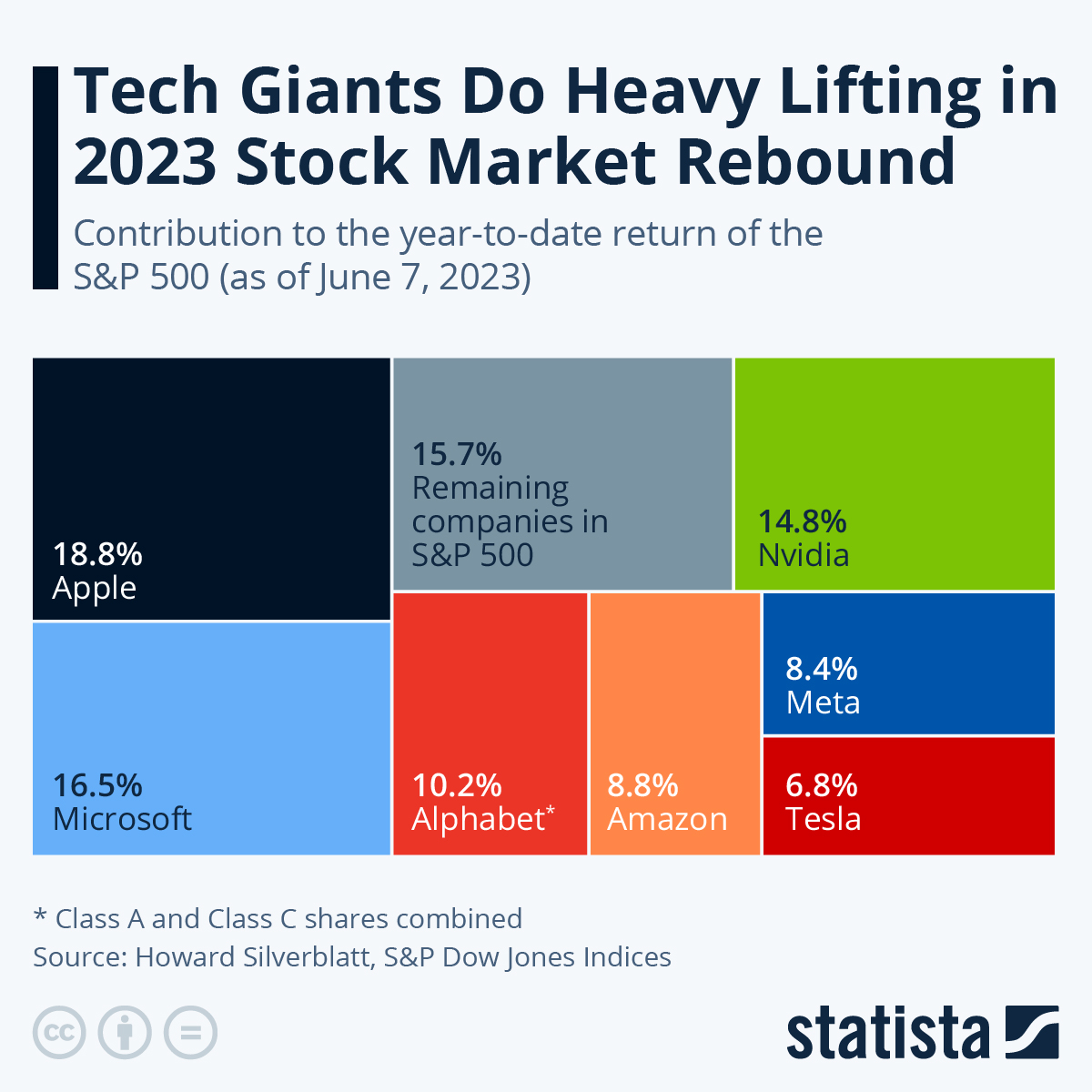


As tech giants Apple and Amazon report their quarterly earnings, the stock market experiences a sharp drop in reaction. Intel's decision to suspend its dividend further adds to the decline of stocks, with the Dow Jones Industrial Average falling nearly 500 points. This news raises questions about the impact of economic developments on the performance of major tech companies, and whether the so-called "good news" for the economy is now seen as bad news for the stock market. Investors are keeping a close eye on these developments as they navigate through uncertain times in the market.
Tech Earnings Drag Down Stock Market: Impact of Economic Data on Growth Stocks
The recent decline in the stock market has been attributed to a combination of factors, including disappointing earnings reports from tech giants Apple and Amazon, as well as Intel's decision to suspend its dividend.
Background
The tech sector has been a driving force behind the market's recovery from the pandemic. However, concerns have been growing in recent months about the sustainability of high valuations in the sector. Tech companies have benefited from a low-interest-rate environment and strong demand for their products during the pandemic. However, as interest rates rise and inflation erodes purchasing power, investors have become more cautious about investing in growth stocks.
Earnings Reports
Apple and Amazon reported their quarterly earnings this week, and both companies disappointed investors. Apple's revenue and profits fell short of expectations, while Amazon reported a wider-than-expected loss. The disappointing results raised concerns about the health of the consumer economy and the impact of rising costs on businesses.
Intel's Dividend Suspension
Intel, the world's largest semiconductor maker, announced this week that it would be suspending its dividend. The move was seen as a sign of the company's financial struggles, as it has been struggling to keep up with the competition in the chip market.
Impact on the Stock Market
The news sent shockwaves through the stock market, with the Dow Jones Industrial Average falling nearly 500 points on Wednesday. The Nasdaq Composite, which is heavily weighted towards tech companies, fell by more than 3%.
FAQs
Tech stocks are falling due to concerns about valuations, rising interest rates, and a slowing economy.
Intel's dividend suspension is a sign of the company's financial struggles and has raised concerns about the chip market.
The decline in tech stocks could signal a slowdown in economic growth.
Investors should consider rebalancing their portfolios to reduce their exposure to overvalued tech stocks.
The outlook for the stock market is uncertain. Investors should be prepared for further volatility in the coming months.

The Indian stock market started the day on a negative note, with the Sensex and Nifty both opening in the red. This was due to weak global cues, with the BSE Sensex shedding 160.86 points and the Nifty falling 75.9 points in early trading. However, some stocks showed positive performance, with Eternal leading the pack. Meanwhile, Nifty 50's early indicator Gift Nifty indicated a positive start for the day. The previous day, Foreign Institutional Investors were net sellers while Domestic Institutional Investors bought equities.

The Telangana Southern Power Distribution Company Limited (TGSPDCL) has introduced "Currentolla Praja Baata" in Nalgonda, Medak, Mahabubnagar, Ranga Reddy, and Hyderabad, aimed at enhancing power distribution in the region. Led by CMD Musharraf Faruqui, the initiative will involve over 9,500 employees who will personally visit different areas to interact with consumers and address complaints. This program hopes to minimize power losses, strengthen the network, and improve the quality and reliability of power supply in Telangana.

A new Randstad India report reveals insights about India's youngest workforce cohort and their expectations for their careers. Gen Z prioritizes financial security, flexibility, and a sense of purpose in their job, requiring employers to go beyond just providing a decent salary. With a preference for a combination of a full-time job and a side hustle, Gen Z's mobility is driven by the pursuit of growth, making it crucial for employers to invest in continuous learning and foster inclusive cultures to retain this transformative generation.

According to Randstad India's latest report, young professionals in India are redefining workplace norms by prioritizing factors like pay, flexibility, and personal values. The report also reveals that Gen Z values continuous learning through AI tools and is more concerned about the impact of AI on job security. This calls for businesses to adapt to changing preferences and attract the next generation of talent by offering a mix of technical excellence and personal autonomy. The findings also emphasize the need for inclusive cultures and flexible policies in order to build resilient, future-ready businesses.

With the Gen-Z workforce making up about 27% of India's population, companies are struggling to retain this energetic cohort. A recent report by Randstad highlights the need for a change in mindset from employers towards the Gen-Zs. While they have long-term aspirations, they are also quick to move on to new opportunities if they feel undervalued or underpaid. This poses a challenge for employers who must find ways to keep this ambitious and driven generation engaged and progressing within their organizations.

Union Home Minister and Minister of Cooperation, Amit Shah, congratulated Amul and Indian Farmers Fertiliser Cooperative Limited (IFFCO) for securing the first and second ranks in the global ranking for cooperatives. This achievement is a testament to the boundless potential of cooperatives, which are being transformed into a global model of empowerment and self-reliance by Prime Minister Narendra Modi. The dairy sector, which is the backbone of rural livelihoods in India, has combined farmer-led cooperatives, women's participation and scientific practices to achieve remarkable progress. Additionally, the National Co-operative Exports Limited, set up by the government, has achieved a significant milestone in exporting agricultural commodities.

After purchasing his retirement property in Swansea, David Barlow has been forced to live in a motorhome on his driveway due to persistent damp and mould issues. Despite complaints to his property managers, the issue has not been resolved and Barlow fears for his belongings. The problem is believed to have been caused by faulty insulation installed by British Gas, but the company denies responsibility. This situation has put a hold on Barlow's retirement plans and has left him feeling frustrated and stuck.

US-based private equity firm Tillman Global Holdings (TGH) is reportedly in advanced discussions to invest up to $6 billion in Vodafone Idea Ltd, which could lead to a change in operational control. However, the investment is contingent on the Indian government providing comprehensive relief covering AGR and spectrum payment dues. If the deal goes through, it could dilute existing promoter holdings, including those held by Aditya Birla Group and Vodafone Plc. While the news has boosted investor sentiment, analysts caution that government approval and debt restructuring clarity are key to the execution of the deal.

The Indian real estate market is undergoing a major shift with rising home prices, as apartments priced between Rs 2 crore and Rs 5 crore now dominate sales. This change has been highlighted by a Redditor who expressed concerns over the dwindling chances of middle-class buyers to afford a house. According to a Moneycontrol report, the trend is a result of big developers focusing more on luxury projects, leaving affordable housing in the backseat. As a result, home ownership for the middle-class seems like a distant dream, with even government employees struggling to afford these expensive properties.

Vodafone Idea's share price saw a significant increase of 14% after the Supreme Court provided further clarity on the AGR dues issue. The court clarified that the government can consider providing relief for both additional and reassessed AGR dues, giving some respite to the struggling telecom operator. At the time of writing, Vodafone Idea's share price was trading at Rs 9.51, with a gain of 8.93%. This comes after the court's previous hearing which did not provide a clear ruling on whether the relief applies to only Vodafone Idea's plea or the entire pending AGR amount of nearly Rs 80,000 crore.